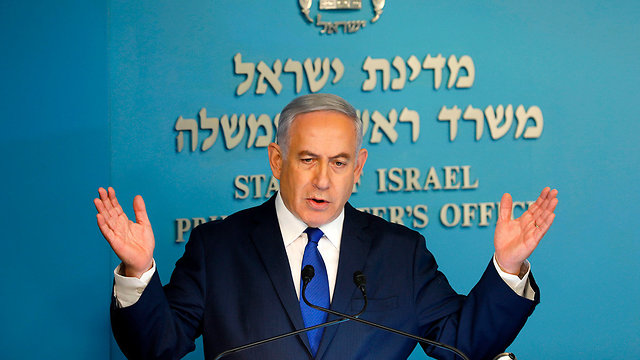Meeting considerable opposition from coalition allies, voter base, PM Netanyahu announces suspension of outline reached with UN on deportation of African immigrants, says he will reexamine it.
Prime Minister Benjamin Netanyahu announced that he is suspending the implementation of the plan reached with the UN High Commissioner for Refugees (UNHCR) on the deportation of African immigrants just hours after announcing it.
Israel reached an agreement with the UNHCR to resolve the African migrants crisis, nixing the government’s controversial mass deportation plan and agreeing to grant temporary legal status to protected populations among the asylum seekers, some 18,000 refugees who would’ve remained in the country regardless.

In a post he wrote in his Facebook account, the premier explained that “in the last few weeks, following tremendous pressure on Rwanda by the New Israel Fund and elements in the European Union, Rwanda has withdrawn from the agreement and refused to absorb infiltrators from Israel who are forcibly removed. Due to this, I decided to strive for a new agreement that would allow us to continue deporting the infiltrators.”
“However, I am attentive to you, and first and foremost to the residents of southern Tel Aviv,” Netanyahu reassured. “Therefore, I decided to meet, together with Interior Minister Aryeh Deri, with representatives of the residents of southern Tel Aviv tomorrow (Wednesday) morning.
“In the meantime, I am suspending the implementation of the agreement, and after I meet with the representatives, I will bring the agreement to a new examination.”
Earlier that day, Netanyahu announced in a press conference the “landmark achievement,” saying it will see 16,250 asylum seekers out of the country, taken to “developed countries like Canada, or Germany and Italy” as part of a measure the UNHCR has committed to organize “and even fund.”
While the UNHCR confirmed an agreement was signed with Israel, it did not name the countries that would accept the migrants, and some of the countries mentioned by Netanyahu deny any such agreement was signed with them.
A spokesman for the German Interior Ministry said he was unaware of any plans to resettle African migrants from Israel to Germany, And in Italy, a Foreign Ministry source said: “There is no agreement with Italy in the context of the bilateral agreement between Israel and the UNHCR.”
Shortly after Italy’s denial, the PMO issued a statement to Italian news agency ANSA, clarifying that Netanyahu only named Italy as an example of a developed Western country, and did not specifically mean to name it as one of the countries willing to take in the asylum seekers, Italian daily la Repubblica reported.

Netanyahu added that the agreement with the UN, as it currently stands, came following strenuous political efforts on their part, noting that at first the UN wanted Israel to keep four asylum seekers as temporary residents for every one deported.
“We did not agree to this, and in the end reached an agreement whereby for each one that leaves, one will remain,” he said.
Netanyahu concluded by stressing that while he, like many others, expected Israel to be able to deport the lot of them, once it was clear it is not an option, the government decided to “do the best it can—get some out, rehabilitate the rest and rehabilitate southern Tel Aviv.”
Later that evening, Netanyahu published a video on Facebook in which he gave further details on the outline.
“We will remove the infiltrators from south Tel Aviv, bring them to moshavim, kibbutzim, and strong communities, so that the burden will not fall on neighborhoods in distress,” he said. “The money we’ll save, and that’s a lot, we’ll invest in rehabilitating southern Tel Aviv.”
He then noted that the new agreement will see 2,000 more immigrants expelled from the state compared to the previous plan, and that “those who will stay, will remain here temporarily for the next five years.”
Coalition turns on PM, urges him to rethink UNHCR outline
The fate of some 37,000 Africans in Israel has posed a moral dilemma for a state founded as a haven for Jews from persecution and a national home. The right-wing government has been under pressure from its nationalist voter base to expel the migrants.
But the planned mass deportation led to legal challenges in Israel, drew criticism from the United Nations and rights groups and triggered an emotional public debate among Israelis.
While receiving the support of more left-leaning organizations and lawmakers, many nationalists and conservatives, including some from Netanyahu’s own Likud party, expressed strong objection to the agreement, claiming it will encourage illegal immigration which would further exasperate the crisis.
Minister of Education Naftali Bennett said the agreement to grant legal status to thousands of ‘infiltrators’ will “turn Israel into a paradise for infiltrators, and constitutes a total surrender to the false campaign that has been disseminated in the media in recent months.”
He added that “by signing this agreement, we are sending a dangerous message to the entire world: ‘Anyone who succeeds in infiltrating Israel illegally will receive a residency award here or in a Western country.'”
Minister of Finance Moshe Kahlon called the proposed outline “insufficient,” saying the number of infiltrators who will receive the status of temporary residence is “large and unacceptable.”
“These are not the results we expected,” lamented Transportation Minister Yisrael Katz. “The good of the residents of south Tel Aviv and the rest of the citizens of Israel must be first and foremost. The government’s policy, as determined, is not to allow anyone who is not recognized as a refugee to remain in Israel, and any arrangement that is made must be within the framework of this policy.”
The Minister of Transportation added that “the consent of various countries to absorb some of the infiltrators into Israel should be welcomed, but not conditioned on an Israeli commitment to grant legal residency status.”
Even Culture and Sports Minister Miri Regev—a strong proponent and close ally of Netanyahu—criticized the agreement.
“The decision that was announced today is dramatic and I am definitely concerned about the quick concession of the basic principles of the government’s immigration policy,” she said. “As far as we know, these are not refugees, but people who have infiltrated (the country) illegally, so the discussions with the UN High Commissioner for Refugees, in my view, are out of place.
The final result, according to which tens of thousands of infiltrators remain in Israel, is very worrying in terms of the identity of the state and its social fabric,” Regev added, saying the plan to relocate them is faulty, as they will not end up leaving in “strong communities,” as Netanyahu said, but in “the periphery,” where they “will cause great damage, as is the case in south Tel Aviv.”
As reported by Ynetnews
